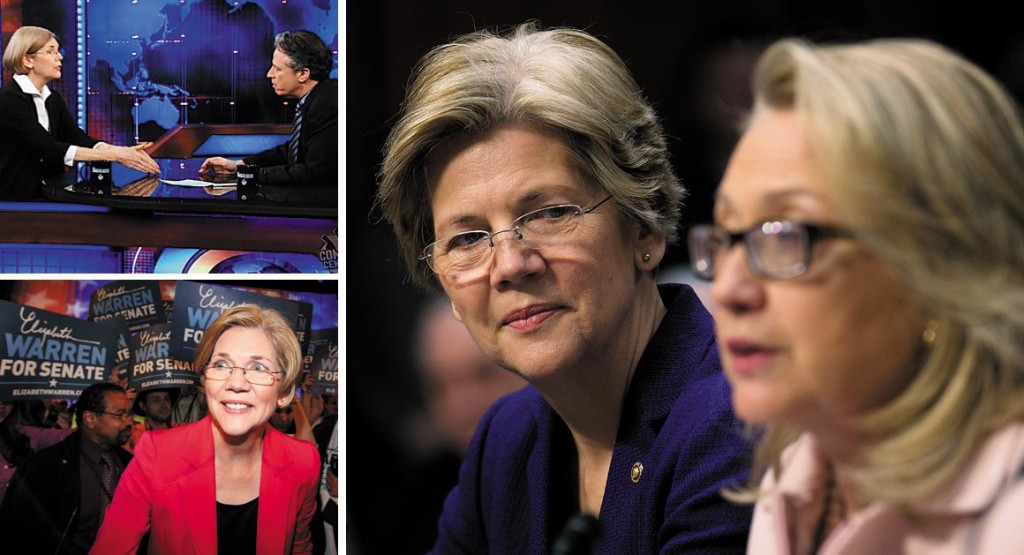
The outsider
Ask Elizabeth Warren for her first impression of Hillary Clinton, and she doesn’t hesitate: She jolts forward to the edge of her seat, snaps her fingers and describes her as “quick!”
Clinton, of course, craves a more emphatic endorsement from Warren, hoping to bring the Democratic Party’s rising populist firebrand into her 2016 fold as soon as possible. Last year, she praised the Massachusetts senator as “a passionate champion for working people” at a campaign event they both attended; Warren was noticeably cooler and barely even acknowledged Clinton in her remarks. And, in December, Clinton invited a still-noncommittal Warren to her mansion in Washington. (Warren politely but firmly suggested that Clinton needs to take a much tougher line on Wall Street.)
But the Clinton encounter Warren remembers most vividly was their first, 17 years ago, when Clinton clearly had all the leverage.
Today, in her airy, high-ceilinged Senate office, Warren recalls being an obscure Harvard Law School professor summoned to deliver a command performance to Clinton backstage at a Boston hotel after the first lady had finished a speech. To this day, she isn’t sure Clinton quite knew who she was; East Wing policy staff simply wanted her to explain a GOP-sponsored bankruptcy bill, then get out. Clinton greeted her briskly, then tucked into a hamburger and fries as Warren launched into a passionate presentation against the bill: Tell the president to veto the damn thing, she said; it was a travesty designed to squeeze “the last couple-tenths of a percent” profit out of hard-pressed women and children who had fallen on tough times as a result of divorce, financial ruin or medical catastrophe.
“I mean this in the nicest possible way: She didn’t know this stuff. … But [she was] one of the smartest people I ever sat down with,” recalls Warren, remembering Clinton peppering her with questions between bites—and pushing the plate to the middle of the table to offer fries. “We get all the way to the end—and I still remember this … she stood up and said, “‘We need to stop that awful bill!’”
Next came a first glimpse of the Hillary whirlwind: “She whips me outside of this tiny room … and she says, “‘PICTURE?’”—and here Warren impersonates Clinton by raising her voice to a crescendo—because the only possible answer was yes.
The first lady did, in fact, go back to persuade Bill Clinton to veto the bill, in Warren’s account: “The next thing that happens, there were skid marks in the hallways of the White House from advisers changing their positions after Mrs. Clinton got involved.”
But what happened later was even more telling—and set the stage for a complicated, tense and still-evolving relationship between the two strikingly dissimilar women atop the Democratic Party in 2015.
Three years after the hamburger summit, in 2001, Hillary Clinton, by then the junior senator from New York, had her own chance to weigh in on the bankruptcy bill. She voted in favor of a modified version (that provided limited protections for women and children) over the vehement objections of Warren and other consumer advocates. It passed, yet when Clinton was running for president in 2007 she glossed over that “yes” vote and claimed, during debates, that she “fought the banks” on bankruptcy reform. Warren has complained about it ever since, one of the reasons Bill Clinton refused to campaign for her during her 2012 Senate campaign. Another is Warren’s attacks on Clinton’s former Wall Street allies, a former Clinton aide tells us.
But Warren has a knack for getting the last laugh. She is now her party’s leading liberal alternative to Clinton, a role she clearly relishes. Despite her repeated denials she is considering the possibility of running, she remains a threat, and not just because her denials always seem phrased only in the present tense.
Warren speaks the language of populist grievance and scoffs at the Clintonian soft-pedal: She has told someone close to her that she remains “worried that Hillary and her people are still too damned close to Wall Street.” Sure, Clinton leads all potential Democratic challengers—Warren included—by 40 or 50 points, depending on the poll, but she lacks that kind of leftist brio. Plus, Clinton is rusty as a campaigner, addicted to six-figure personal appearance fees and a multimillionaire friend of Wall Street at a time of widespread concern about the country’s glaring economic inequality.
Some of Warren’s friends told us she would reconsider if Clinton were to exit the race unexpectedly. (“Opportunity knocks, and she runs towards it, obviously,” says Jody Freeman, a friend from Harvard, speaking more generally of Warren’s approach.) Run Warren Run, a group pressing her to run that is infused with $1.25 million from liberal groups MoveOn.org and Democracy for America, now has offices in New Hampshire and Iowa.
In an interview, Warren maintained, with a dismissive sweep of her hand before the question could even be posed, that the White House thing just isn’t going to happen. And she pushes back, hard, when we suggest that she is using her hard-won national platform merely to pull Clinton to the left in 2016. “You are framing it, in a sense, too narrowly,” she says. “No, the question for me is how can we change, how to make this country change, how to get this country back on a path where people can build real economic security.”
As for Warren’s own path? “She’s much, much too smart to run for president,” says her friend and ally, former Massachusetts Representative Barney Frank, who co-authored the Wall Street regulation bill passed after the 2008 financial crisis that included Warren’s signature initiative, a consumer board that looks after the interests of bank and credit-card customers. “She has no chance to win—none—and she would kill her credibility if she did. She’s devoted her life to issues that she cared about, and the second people perceive her as ambitious, you know, interested in running, that’s over.”
(From: Politico)


